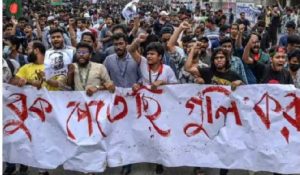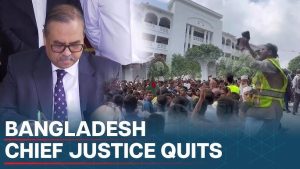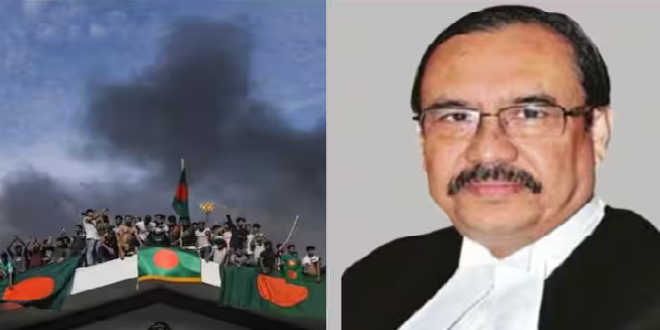11-08-2024
DHAKA: The Chief Justice of Bangladesh’s top court has said he agreed “in principle” to resign after an ultimatum from protesters, days after Prime Minister Sheikh Hasina fled to neighboring India.
Obaidul Hassan, who was appointed to helm the Supreme Court last year and is seen as a loyalist to Hasina, was told to step down on Saturday by protesters who gathered outside the court in the capital, Dhaka. Journalist Tanvir Chowdhury, reporting from Dhaka, said students decided to take to the streets when they heard reports that Hassan was holding a meeting with justices of the Appellate Division.
 “They viewed this as a judicial coup in the making, so they quickly gathered at the Supreme Court and demanded that he immediately resign,” Chowdhury said.
“They viewed this as a judicial coup in the making, so they quickly gathered at the Supreme Court and demanded that he immediately resign,” Chowdhury said.
A formal letter confirming Hassan’s decision to step down was expected after consultations with President Mohammed Shahabuddin. The students believe the Supreme Court to be highly politicized and want the other seven members to also resign. Awami League party leader Hasina, 76, fled by helicopter to India on Monday, according to Chowdhury
Her government was accused of widespread human rights abuses including the extrajudicial killing of thousands of her political opponents.
Hassan oversaw a much-criticised war crimes tribunal that ordered the execution of Hasina’s opponents, and his brother was her longtime secretary.
Cabinet ministers left blindsided by her sudden fall have gone to ground, while several top appointees have been forced out of office, including the national police chief and the central bank governor.
On Friday, the bank’s governor, Abdur Rouf Talukder, resigned from the post, citing personal reasons. Protesters had stormed the central bank’s headquarters amid the political upheaval that led to the end of Hasina’s 15-year rule.
Muhammad Yunus, who won the Nobel Peace Prize in 2006 for his pioneering work in microfinance credited with helping millions of Bangladeshis out of poverty, is leading a transitional government, another demand by the student leaders.
 The economist took office on Thursday as “chief adviser” to a caretaker administration comprised of civilians bar one retired brigadier-general. He said he wants to hold elections “within a few months”.
The economist took office on Thursday as “chief adviser” to a caretaker administration comprised of civilians bar one retired brigadier-general. He said he wants to hold elections “within a few months”.
Yunus appealed for religious unity on Saturday as he embraced the weeping mother of the first student shot dead by police during antigovernment protests last month.
“Don’t differentiate by religion,” he told reporters. “Our responsibility is to build a new Bangladesh.”
Speaking of Abu Sayeed, Yunus said the slain 25-year-old was now “in every home”.
“The way he stood, we have to do the same,” he said as he paid his respects alongside members of the advisory cabinet. “There are no differences in Abu Sayeed’s Bangladesh,” he added.
After weeks of antigovernment protests, on August 5, Bangladesh’s Prime Minister Sheikh Hasina stepped down and fled the country in a spectacular turn of events. Until the last moments of her rule, her grip on power seemed all but absolute even after the deaths of hundreds of students who hit the streets demanding first reform of civil service job allocations and then her resignation.
Hasina’s stubborn refusal to compromise, overreliance on state violence, and deep patronage ties to a privileged clientele class had long disconnected her from the Bangladeshi public. She perhaps did not see the extent to which she had lost the support of the majority until the very end, leaving her with no choice but to flee the country. The collapse of her 16-year rule renders both a cautionary tale to dictators worldwide and a proof of the sheer willpower of a nation’s disillusioned youth. (Int’l Monitoring Desk)
 Pressmediaofindia
Pressmediaofindia




